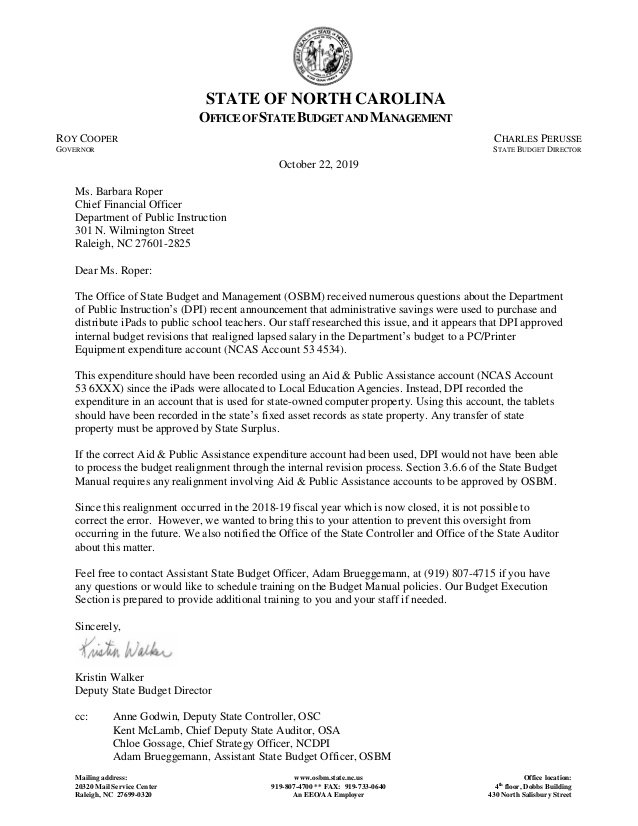
By Alex Granados, senior reporter, EducationNC
The Office of State Budget and Management sent a letter to the Department of Public Instruction on Oct. 22 challenging state Superintendent Mark Johnson’s purchase and distribution of iPads to public school teachers.
In the letter from Kristin Walker, deputy state budget director, to Barbara Roper, the chief financial officer at DPI, Walker said that the use of the money wasn’t appropriate and that her office was sending the letter to prevent this from happening again.
“… we wanted to bring this to your attention to prevent this oversight from occurring in the future,” she wrote.
Walker also states that OSBM notified the Office of the State Controller and the Office of the State Auditor about this matter.
In the letter, Walker said that DPI purchased the iPads by approving “internal budget revisions that realigned lapsed salaries in the Department budget to a PC Printer Equipment expenditure account.”
She goes on to say that the expenditure should have been done through an aid and public assistance account “since the iPads were allocated to Local Education Agencies.” She said that the expenditure was instead recorded in an account that is for state computer property. Because of that, the iPads should have been “recorded in the state’s fixed asset records as state property.” She said that transfer of state property — which these iPads were — should have been approved by State Surplus.
Walker then says that if the right account had been used, DPI wouldn’t have been able to unilaterally make this move without approval by OSBM.
The letter states that it is now too late to “correct the error,” and ends by saying: “Our Budget Execution Section is prepared to provide additional training to you and your staff if needed.”
Johnson’s purchase of iPads and subsequent distribution of them to J.H. Rose High School in Greenville and the Ocracoke School has been a source of contention between Johnson and the State Board of Education. At a State Board meeting in the first week of October, State Board Chair Eric Davis questioned Johnson about where the money came for the iPads.
“I’ve been clear about that,” Johnson said. “I’ll remind you again, Mr. Davis.”
Johnson went on to say that the Department of Public Instruction is doing better under his leadership, operating more efficiently, and ending the year with money leftover in the superintendent’s budget.
Graham Wilson, director of communications for Johnson, said in an email in October that the superintendent’s budget is what the superintendent uses for things like staff, operations, and “discretionary expenditures in support of public education in North Carolina.”
“It was money that was not spent because of my fiscal conservative nature,” Johnson said during the Board meeting, adding, “With that, instead of sending that money back to the General Assembly, I decided I wanted to have the biggest impact I can.”
Davis responded at the October meeting that there are needs across the state. He asked how Board members should respond when they are asked what criteria are used for giving out the iPads.
“They can email me,” Johnson said.
State Budget Director Charles Perusse said that the letter from OSBM applies to iPads purchased in Fiscal Year 2018-19 by DPI. That fiscal year runs from July 1, 2018-June 30, 2019.
In August of this year, Johnson announced the distribution of iPads for literacy purposes.
Back in August 2018, Johnson announced the purchase and distribution of iPads to K-3 reading teachers around the state, saying he spent around $6 million on them.
On Nov. 1, Roper responded to OSBM’s letter, saying that future purchases “on behalf of local education agencies” will be “coded” to the right account. She goes on to say that schools that received the iPads are being told that the devices from “last year’s purchase remain State property on loan to them for disaster recovery or innovative pilot programs.”
EdNC reached out to Wilson for comment. He said he and Johnson would let Roper’s letter stand on its own.
This story is courtesy EducationNC, a non-profit organization working to expand educational opportunities for all children in North Carolina, increase their academic attainment, and improve the performance of the state’s public schools. EdNC provides citizens and policymakers with nonpartisan data, research, news, information, and analysis about the major trends, issues, and challenges bearing on education.
This story originally appeared on OBXToday.com. Read More local stories here.





Be the first to comment